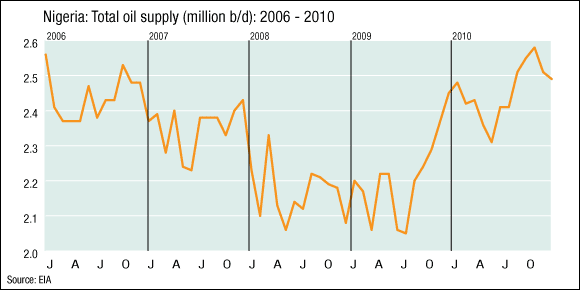Nigeria's elections: A three-way contest
The Politics of Oil
Platts Jacinta Moran takes an in depth look at the upcoming elections in Nigeria, and outlines how the outcome could re-shape the nation and its petroleum industry.
March 23, 2011 - In under two weeks, Nigeria will hold elections that may be the most fiercely contested polls since the end of military rule ended in 1999 but politically motivated violence is escalating, and the vote itself is expected to be just as contentious as previous polls. (See: The candidates and the pledges).
Nigerians will go to the polls on April 2 to elect National Assembly members, on April 9 to choose a president, and on April 17 to elect state governors and state assembly representatives.
But a recent surge in violence, including bombings, political attacks and sectarian clashes, threatens Nigeria's ability to hold a credible vote.
Human Rights Watch said more than 50 people have been killed in violence linked to political party primaries and election campaigns since November 2010.
A warning this week purportedly coming from the Movement for the Emancipation of the Niger Delta (MEND) indicates that it plans to commence simultaneous bomb attacks on oil installations in the Niger Delta area as well as in Lagos and Abuja, the capital.
A day later, an explosion hit an oil pipeline operated by Italy's Eni in southern oil state of Bayelsa.
MEND was responsible for the most of the attacks on Nigeria's oil production facilities between 2006 and 2009, which cut the country's output by as much of a quarter.
An amnesty brokered by President Goodluck Jonathan in 2009 has brought more than a year of relative peace in the restive region, with no major attacks on oil facilities, and production levels have recovered to around 2.6 million b/d.
Nigeria: Total oil supply (million b/d):
2006 - 2010

But the amnesty failed to address the root causes of the conflict, which has posed a fundamental domestic challenge to Nigerian security for more than a decade, and the militants have returned to their trenches.
Renewed unrest is not only a blow to oil companies in Nigeria, which bore the brunt of attacks in recent years but would be an embarrassment for Jonathan, the first Christian ruler from the south.
Jonathan's emergence as the ruling People's Democratic Party's candidate was highly controversial in Nigeria's north.
An internal arrangement within the PDP sees it rotate its candidates between the north and south every two terms as a way of smoothing religious and ethnic differences.
Jonathan was vice president before taking over following the death of Umaru Yar'Adua, a Muslim from the north, in May 2010.
Some politicians from the north had opposed his candidature on grounds that Yar'Adua died before he completed the term allotted to their region.
The candidates and the pledges
As the incumbent, Jonathan is the favourite to triumph at the poll after defeating a challenge from the mainly Muslim north to clinch the ruling party nomination.
The PDP candidate has won every presidential election since the end of military rule 11 years ago, and PDP will also be hard to dislodge in 109-seat Senate and 360-seat House of Representatives.
Jonathan vowed fighting graft and insecurity would be top priorities during his campaign. Maintaining peace in the Niger Delta, the heartland of the OPEC member's oil industry, and the passage of the oil reform would also be a top priority.
Nigeria's Senate the week ended March 18 passed a $31.8 billion budget for the 2011 fiscal year, 17% more than what Jonathan proposed in December.
Africa's top oil producer is basing its spending plans on an oil price of $75/barrel, $10 more than was originally in Jonathan's budget. With oil prices hovering around $97/barrel, Nigeria's government coffers should be filling at record pace.
But the country's crude account (ECA), launched in 2003 into which Nigeria currently saves any oil revenue above a benchmark oil price, has dropped from $20billion to $6.2 billion in three years. (See related price chart: Brass River and Qua Iboe differentials (mean $/bbl): January 4, 2010 - March 18, 2011).
Some are questioning why the ECA is being depleted at a time when Nigeria should be benefiting from higher oil prices.
The Petroleum Industry Bill will bring sweeping reform to the Nigerian energy industry but delay in the passage of the new fiscal laws has caused investments delays in the development projects and may result in medium term production loss.
Jonathan had pledged to the public that it will be law before the end of the current administration in May, which is now highly unlikely.
Jonathan's main rival, Muslim ex-military ruler Muhammadu Buhari and the Congress for Progressive Change party's candidate, made electoral reform the cornerstone of his campaign.He ruled Nigeria between December 1983 and August 1985, an iron-fisted administration best remembered for its campaign against graft in which politicians were jailed. Some northern states could fall to Buhari's CPC.
Jonathan's other rival is Nuhu Ribadu, a northerner who used to run the country's anti-graft agency. Ribadu, the youngest of the three main candidates is running with the Action Congress of Nigeria (ACN) and is gaining ground in the south-west around Lagos.
With the conclusion of the state-by-state campaign by Jonathan and Vice President Namadi Sambo, the stage is now set for the grand finale of the PDP's presidential campaign scheduled to be held on March 26 in Eagle Square, Abuja.
On October 1 last year, a deadly attack by militants from the country's oil region killed 12 people close to the same venue.
The way the next government of Nigeria, whoever is elected, handles the root problems of the Delta, financial corruption and finds work for the former militants, will be critical to the prospects for the country's economy and on the lives of ordinary Nigerians.
To subscribe or visit go to: http://www.platts.com
![]()